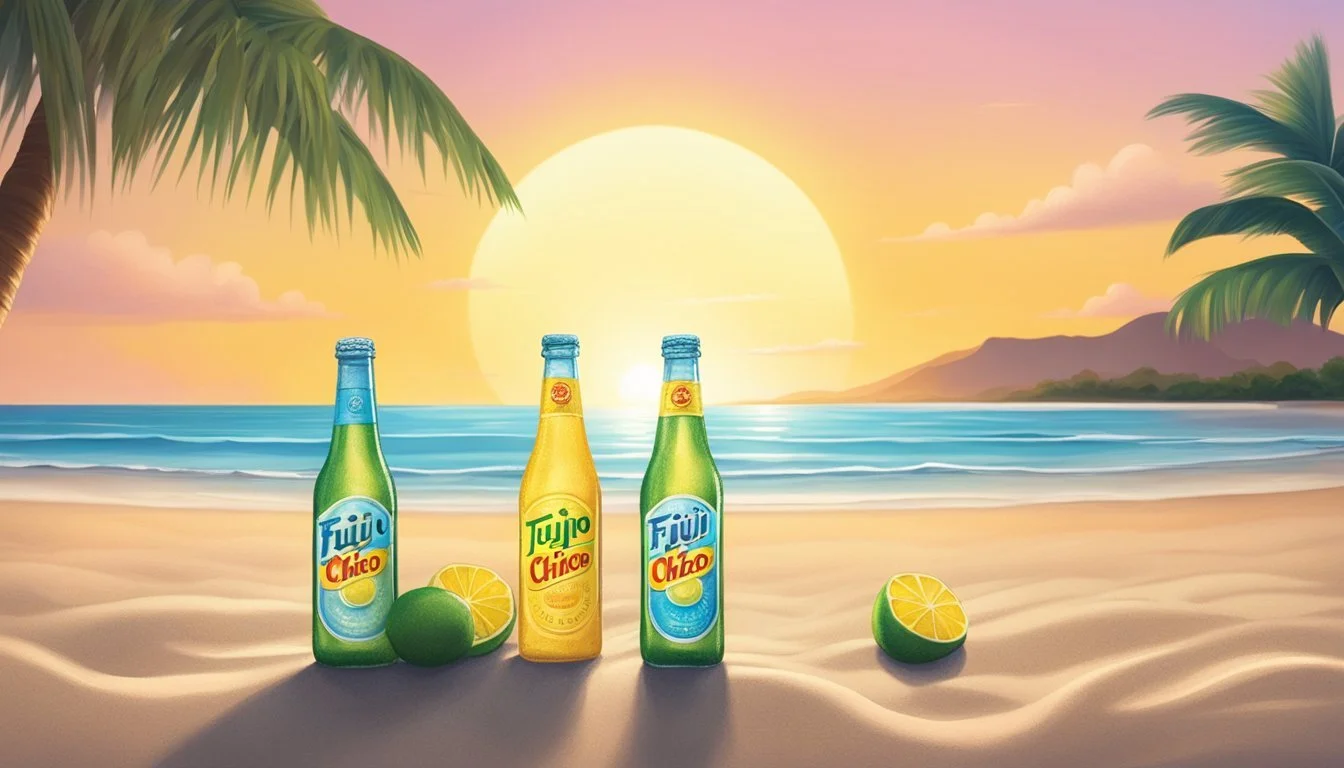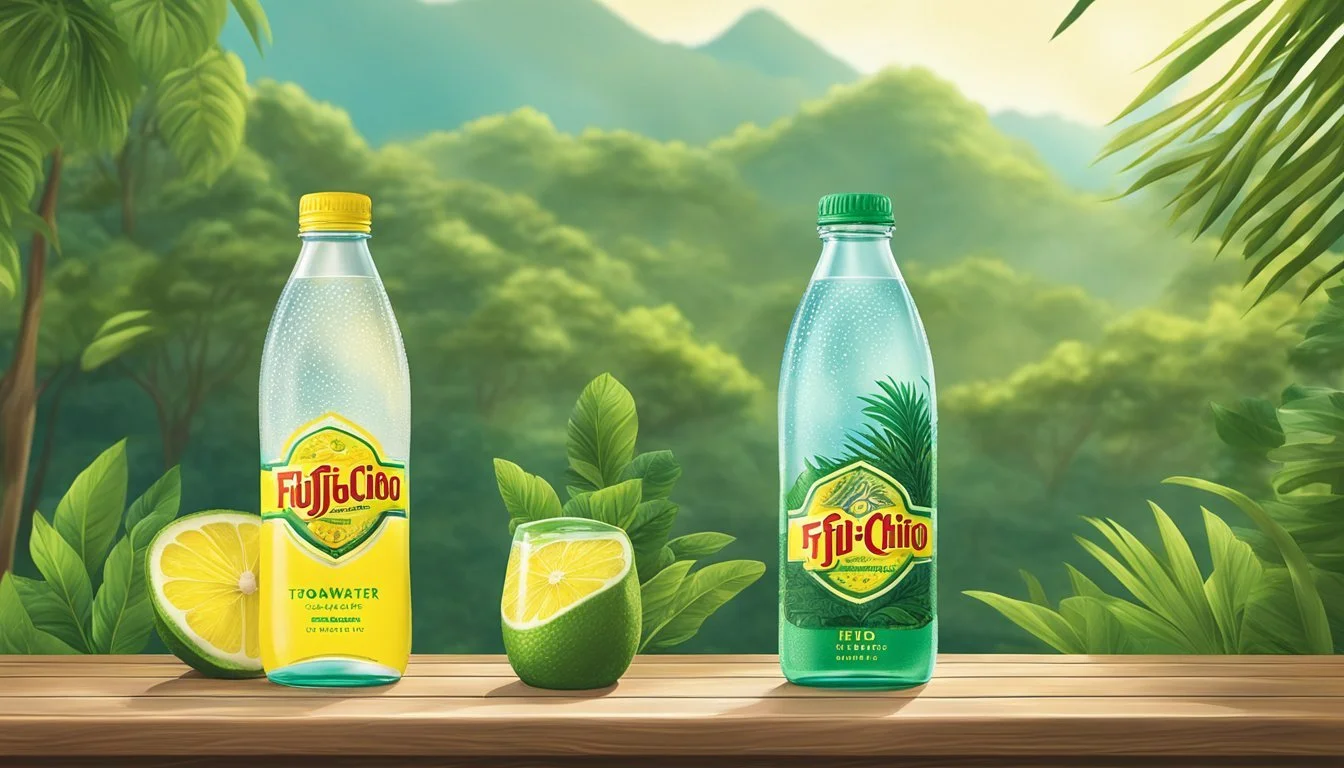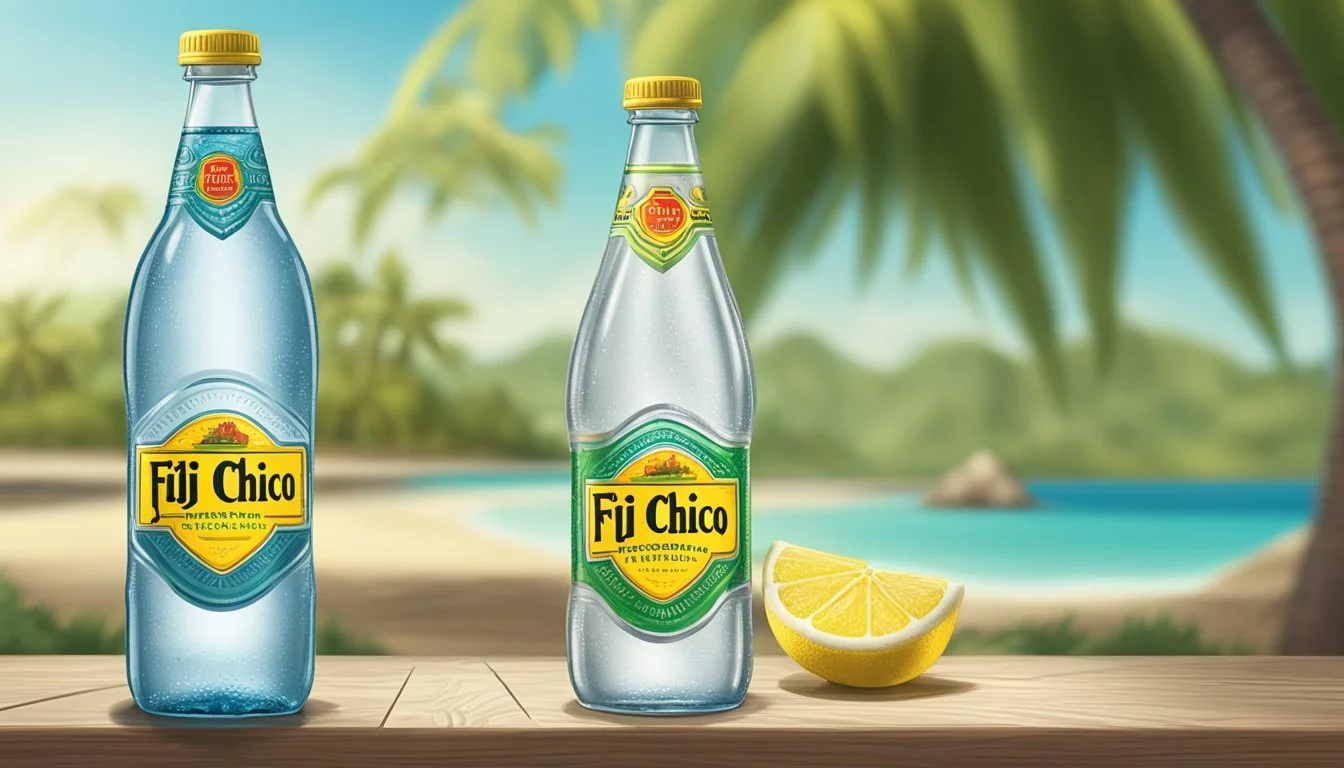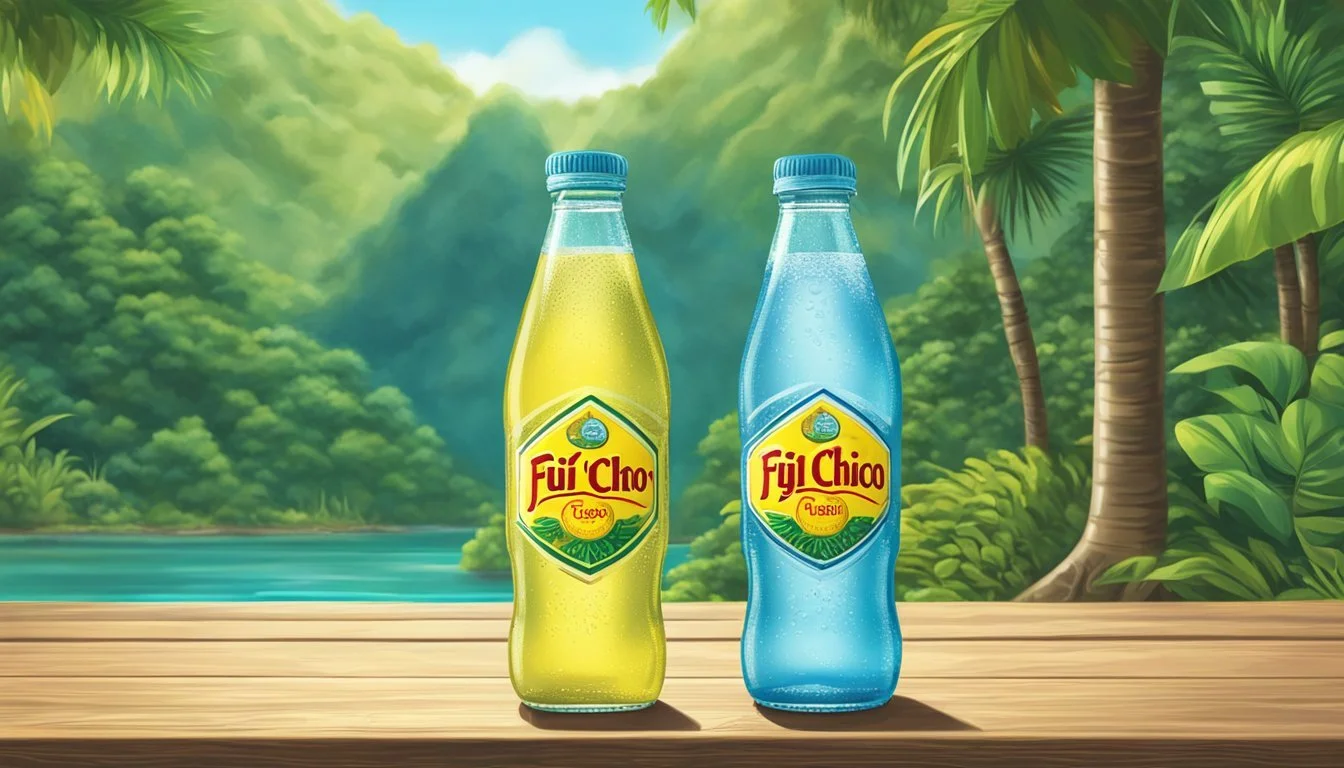Fiji vs. Topo Chico
Comparing Quality and Taste of Bottled Waters
The bottled water industry offers a plethora of choices, each with its own unique source and taste profile, leading consumers to often debate which brand reigns supreme. Two prominent names in this discussion are Fiji and Topo Chico, both of which have garnered distinct fan bases. Fiji water, known for its soft mouthfeel and slightly alkaline pH level, originates from an artesian aquifer in the remote Fiji Islands. Its taste and purity are influenced by the volcanic rock it filters through, providing a composition that stands out in the market.
Topo Chico, in contrast, is a sparkling mineral water with roots in Monterrey, Mexico, where it has been sourced from the Cerro del Topo Chico spring since 1895. Its effervescence and high mineral content give it a bright and refreshing taste that has not only found favor within the craft beverage community but also among consumers seeking an alternative to sweeter sodas. The brand's iconic glass bottle and retro branding add to its aesthetic appeal and distinct identity.
Deciding which bottled water is better involves more than a straightforward comparison; it can hinge upon individual preferences for still versus sparkling, mineral content, and the environmental impact of producing and transporting bottled water. As such, consumer choice often reflects a blend of sensory experience and personal values when selecting between Fiji's tropical origins and Topo Chico's bubbly zest.
History and Origin
The origins of a water brand can often influence consumer perception and market value. Enhanced by geographical sources and historical roots, Fiji Water and Topo Chico possess distinct backgrounds that contribute to their unique taste profiles and brand images.
Fiji Water Background
Fiji Water originated from the tropical islands of Fiji. Sourced from an artesian aquifer located in the Fijian village of Viti Levu, the brand prides itself on its remote and pristine ecosystem. Historically, Fiji Water began exporting its characteristic soft and smooth bottled water in the early 1990s, asserting its place among premium water brands, such as Voss and Evian.
Founded: Early 1990s
Location: Viti Levu, Fiji
Aquaduct: Artesian aquifer
Topo Chico's Legacy
Topo Chico, on the other hand, has deep historical roots situated in Monterrey, Mexico. Its name is derived from the Cerro del Topo Chico, a small mountain near which the natural mineral water is sourced. Established in 1895, Topo Chico has a long history of being revered for its crisp and refreshing taste well before the Coca-Cola Company purchased it in 2017. The brand enjoyed regional popularity in Mexico and Texas before expanding into international markets.
Founded: 1895
Location: Monterrey, Mexico
Acquisition by Coca-Cola: 2017
Water Sources and Filtration
When considering the quality of bottled water, the source and the filtration process are pivotal factors. Both Fiji Water and Topo Chico boast unique sources that contribute to their distinct taste and mineral content.
Fiji's Natural Artesian Source
Fiji Water is sourced from an artesian aquifer deep within the earth on the remote Yaqara Valley of Viti Levu, Fiji's main island. The water is naturally filtered through volcanic rock which adds minerals and results in a soft, smooth taste. The aquifer is naturally pressurized, which means that the water is pushed to the surface without the aid for mechanical pumps, ensuring minimal human contact and a commitment to sustainability.
Topo Chico's Mineral Springs
Topo Chico originates from the mineral springs at the foot of the Cerro del Topo Chico mountain in Monterrey, Mexico. These mineral waters are known for their high carbonation and a blend of minerals, which come from the mountain valley where the water is collected. Unlike some bottled waters like Aquafina, which undergo rigorous filtration and demineralization, Topo Chico's filtration process is designed to preserve the rich mineral content that characterizes the water.
Water Quality and Content
When considering which bottled water is superior, Fiji and Topo Chico, the water quality and content play pivotal roles. Consumers often choose based on mineral composition and purity levels, expecting clean drinking water with beneficial minerals and free of harmful contaminants.
Analyzing Mineral Content
Fiji Water is known for its high mineral content, especially silica, which is believed to provide a smooth mouthfeel. Here is a breakdown of its typical mineral composition:
Calcium: 18 mg/L
Magnesium: 15 mg/L
Potassium: 5 mg/L
Sodium: 18 mg/L
The water is sourced from an underground aquifer in the Fiji Islands, contributing to its unique mineral profile. It's also notable for its sustainability efforts, such as reducing plastic usage and investing in renewable energy.
Topo Chico, on the other hand, is a sparkling mineral water that also contains a variety of minerals. Primarily sourced from Mexico, it includes the following:
Calcium: Varies by source, often higher due to natural carbonation
Magnesium: Generally high levels
Potassium: Present, enhanced by the natural effervescence
Sodium: Moderately high, a characteristic feature of many sparkling waters
Both brands offer distinctive mineral content that can augment one's intake of these essential nutrients.
Testing for Contaminants
The safety of bottled water is regulated by the Food and Drug Administration (FDA), which sets limits on contaminants. Fiji Water has a reputation for its clean drinking water, with rigorous filtration and quality checks to ensure it meets health standards. Its remote source helps protect it from industrial pollutants typically found in some other water sources.
As for Topo Chico, recent testing by Consumer Reports has shown that Coca-Cola, the beverage maker, has made efforts to reduce the level of PFAS chemicals — which are contaminants of concern — in Topo Chico Mineral Water. However, it is crucial for any bottled water to meet the FDA's guidelines to be deemed safe for consumption.
In their commitment to provide safe and contaminant-free water, both brands regularly test for common pollutants, striving to offer quality that goes beyond the mandated regulations.
Taste and Flavor Profiles
The evaluation of bottled waters like Fiji and Topo Chico primarily hinges on their respective taste and flavor profiles, which are informed by their unique sources and mineral content.
Comparing the Taste of Fiji and Topo Chico
Fiji water, sourced from an artesian aquifer in the Fiji Islands, has a smooth taste and a somewhat soft mouthfeel, which can be attributed to its high silica content. This gives it a distinctive silky texture that is often associated with a more refined taste among non-carbonated, or still, waters. Topo Chico, on the other hand, is a carbonated mineral water sourced from Monterrey, Mexico. It is celebrated for its crisp carbonation and it often features added flavors such as lime or grapefruit, providing a tangy zest that is a sharp contrast to the smoother Fiji.
Fiji: Smooth, soft, silica-rich
Topo Chico: Crisp, carbonated, often citrus-flavored
The Appeal of Sparkling Versus Still Water
The primary distinction in the appeal of Fiji and Topo Chico lies in the preference for carbonation. Sparkling water, like Topo Chico, provides a refreshing effervescence that can invigorate the palate, making it a popular choice for those who enjoy the sensation of carbonation. Its bubbles are often favored for their ability to enhance the perception of various added flavors such as lime and grapefruit.
Sparkling Water: Refreshing, effervescent, flavor-enhancing
Still Water: Smooth, palate-cleansing, subtly flavored
Fiji water, being non-carbonated, lacks this effervescence but is preferred by those who seek a purer and calmer taste experience without the influence of carbonation. It often carries a neutral flavor profile that can complement food without altering its taste.
Packaging and Branding
When choosing between Fiji and Topo Chico bottled waters, it's not just the water itself that holds sway; the packaging and branding exert significant influence on consumer preferences and environmental impact.
Bottle Design and Consumer Appeal
Fiji Water is known for its distinctive square shape, soft, tropical aesthetic, and the hibiscus flower prominently featured on the label. The brand recently updated its label design to better showcase the product's natural origins. In contrast, Topo Chico maintains a vintage charm with its retro logo and traditionally styled glass bottles, which are often favored for their aesthetic appeal.
Fiji: Square-shaped bottles, tropical design elements.
Topo Chico: Glass bottles, classic branding.
Environmental Impact of Bottled Water
Sustainability and recyclability are important considerations in the bottled water industry. Fiji makes its bottles from PET plastic which is recyclable, and they have engaged in efforts to reduce the carbon footprint of their products. Topo Chico's glass bottles, while heavier which may impact their carbon footprint in terms of transportation, offer excellent recyclability and can be reused multiple times, potentially reducing waste.
Fiji: PET plastic bottles, recyclability programs.
Topo Chico: Reusable glass bottles, recyclable materials.
Both brands have taken steps to balance consumer appeal with sustainability, yet the choices they make in packaging materials hold different implications for the environment.
Market Presence and Availability
When evaluating the market presence and availability of Fiji Water and Topo Chico, one must consider their distribution channels and the loyalty they command among consumers.
Sales and Distribution Channels
Fiji Water has established itself as a leading bottled water brand in the United States, with a net favorability rating that outpaces many competitors. The brand's sales are bolstered through a variety of distribution channels, including grocery stores, convenience stores, restaurants, as well as online platforms such as Amazon. The brand's strategic presence in both brick-and-mortar locations and online marketplaces facilitates widespread consumer access.
Topo Chico, on the other hand, has been sourced and bottled in Monterrey, Mexico, and also enjoys widespread availability. Its distribution in the United States extends through similar channels as Fiji Water, with a strong emphasis on grocery stores and online sales through e-commerce sites like Amazon. While Topo Chico has a longstanding heritage, it is a mineral water with a specific niche due to its carbonation.
Brand Cult Following and Loyalty
The market presence of a water brand is not solely dependent on sales and distribution but also on the loyalty it commands from consumers. Fiji Water, with its high favorability rating, indicates a significant brand cult following and consumer loyalty in the U.S. market. This is reflected in their choice to prioritize the quality of their product and the consequent perception amongst consumers as a premium bottled water brand.
Topo Chico has garnered a dedicated cult following, particularly among consumers who seek out the unique taste and effervescence of mineral water. This loyalty has been built over more than a century, with the brand's history often cited as a testament to its authenticity and premium quality. The growing sales in the U.S. also demonstrate the brand’s increasing popularity and the consumer loyalty it has fostered.
Health and Dietary Considerations
When choosing between Fiji and Topo Chico bottled waters, consumers commonly weigh the health and dietary implications. It's essential to understand how mineral content and pH levels can impact overall hydration and wellness.
Benefits of Mineral Water Consumption
Mineral water, such as Topo Chico, is often sought after for its content of naturally occurring minerals. Regular consumption of mineral water can contribute to an individual's daily intake of minerals, which may include calcium, magnesium, and bicarbonates. These minerals are crucial for bone health, metabolic functions, and maintaining a balanced pH in the body. Unlike soft drinks or high-sugar beverages, mineral water offers a calorie-free option that supplies these beneficial nutrients without added sugars or chemicals.
Fiji water, while also considered a type of mineral water, boasts its own unique profile with a high silica content. Silica is associated with supporting strong bones, teeth, and connective tissue. The absence of flavor-enhancers or additional ingredients positions both these bottled waters as healthier alternatives to tap water in regions where potable water might be compromised, or to soft drinks which offer no nutritional benefits.
Hydration and Alkalinity Factors
Hydration is essential for all bodily functions, and both Fiji and Topo Chico offer clean drinking water options that support hydration. However, an interesting factor to consider is the pH level of the water; some research suggests that alkaline water, with a higher pH, might have hydration and antioxidant benefits. For instance, Fiji water has a pH level of approximately 7.7, making it slightly more alkaline than regular tap water which typically has a neutral pH of 7. Essentia, though not the subject of this comparison, boasts an even higher pH level and demonstrates the diversity available in bottled waters.
Topo Chico, stemming from a natural source, is often enjoyed for its crisp taste and effervescence, which can be refreshing without sacrificing hydration benefits. However, consumers should remain aware of any possible presence of substances such as per- and polyfluoroalkyl substances (PFAS) that were previously reported in the brand, although the company has since taken steps to reduce them, understanding that any level of these substances is best minimized for health.
In conclusion, when it comes to health and dietary considerations, one must assess the mineral content and pH levels based on individual health goals and dietary needs. Both Fiji and Topo Chico offer distinct advantages that may align with different priorities, whether it is enhanced mineral intake or a preference for alkaline water.
Comparative Analysis
In examining Fiji and Topo Chico bottled waters, the focus is on price and consumer sentiment, pivotal factors in consumer choice.
Price Evaluation
When assessing the cost of Fiji and Topo Chico, consumers may find noticeable differences. Here is a breakdown considering a standard 500ml (16.9oz) bottle based on average retail pricing:
Brand Average Price (USD) Fiji $1.50 - $2.00 Topo Chico $1.00 - $1.50
While Fiji often markets itself as a premium water choice, it is typically more expensive than Topo Chico. Other brands such as Dasani and Poland Spring are regularly less costly than Fiji, which could influence consumers seeking value. Evian is another premium option that may rival Fiji in price, while LaCroix, although not a still water brand, offers a sparkling alternative often at a lower price than Fiji's still water. Nestlé offers a range of water products that compete across various price points.
Consumer Reviews and Preferences
Consumer feedback varies remarkably across different platforms, yet certain trends are discernible. Fiji water is often praised for its taste and its "soft" mouthfeel, likely a result of the natural silica content. In contrast, Topo Chico's strong carbonation and mineral taste receive commendation from those who prefer sparkling water with a notable flavor profile.
Consumer Preferences in Brief:
Fiji: Valued for its smooth taste and purported health benefits.
Topo Chico: Favored for its unique carbonation and mineral-rich taste.
As preferences between still and sparkling water are highly subjective, some consumers show strong loyalty to their preferred brand. Among sparkling water enthusiasts, Topo Chico may have an edge over sparkling water brands like LaCroix due to its signature "slicing bubbles." In the context of still water, Fiji competes with brands such as Evian, which also positions itself as a premium selection, whereas Dasani and Poland Spring are often viewed as more accessible options. Preference plays a significant role, with some consumers willing to pay a premium for the taste and quality they associate with Fiji, while others prefer the affordability and unique taste of Topo Chico.
Cultural and Social Influence
The social and cultural appeal of bottled waters like Fiji and Topo Chico can be traced through their presence in culinary practices and their iconic status in society, each carving out a distinct niche in the beverage industry.
Water in Culinary and Mixology
Fiji Water, drawn from an aquifer in Fiji, has positioned itself as a pure, natural option for hydration, subtly entering the culinary scene. It is often chosen by chefs and connoisseurs who seek a neutral-tasting water to accompany and not overshadow the flavors of meals.
In contrast, Topo Chico, a sparkling mineral water with roots in Mexico, stands out in mixology. Its crisp carbonation and mineral content make it a preferred mixer in cocktails, especially in trendy drinks like the "Ranch Water" where it complements rather than competes with the flavors of the spirits used.
Iconic Status in Society
Topo Chico has garnered a reputation as the in-the-know mixer among mixologists and has a cultural cachet, particularly among hip, younger consumers. It has been known to ride the wave of the seltzer trend, which LaCroix helped popularize.
Meanwhile, Fiji Water has cemented its status as a premium bottled water. It is associated with a certain social status, often being visible in the hands of celebrities and at high-profile events, thus emphasizing its cultural impact as a symbol of luxury and exclusivity.
Conclusion and Recommendations
When considering whether Fiji or Topo Chico is the better bottled water choice, consumers should weigh several factors, including health implications, taste, and environmental impact.
Fiji Water originates from an aquifer in the Fiji Islands and is known for its soft taste and high silica content. It is packaged in single-use plastic bottles, which may be concerning for environmentally conscious consumers.
Topo Chico, a Mexican mineral water, has been sourced from Monterrey since 1895. It boasts a unique mineral composition and is often preferred for its refreshing taste and effervescence. However, concerns have been raised about the presence of high levels of certain chemicals in some tests.
Consumer Recommendation:
For those prioritizing taste and effervescence, Topo Chico is an excellent choice.
Consumers seeking a smooth taste and a higher pH level might prefer Fiji Water.
Regarding health considerations, unflavored versions of bottled waters are generally preferable.
Those concerned with environmental sustainability should consider the impact of single-use plastic bottles and seek to recycle.
Final Verdict:
Neither Fiji nor Topo Chico unequivocally surpasses the other. The decision should be based on individual preferences and values. It is recommended to choose unflavored options to avoid additives and to stay informed about any changes in water quality reports.







